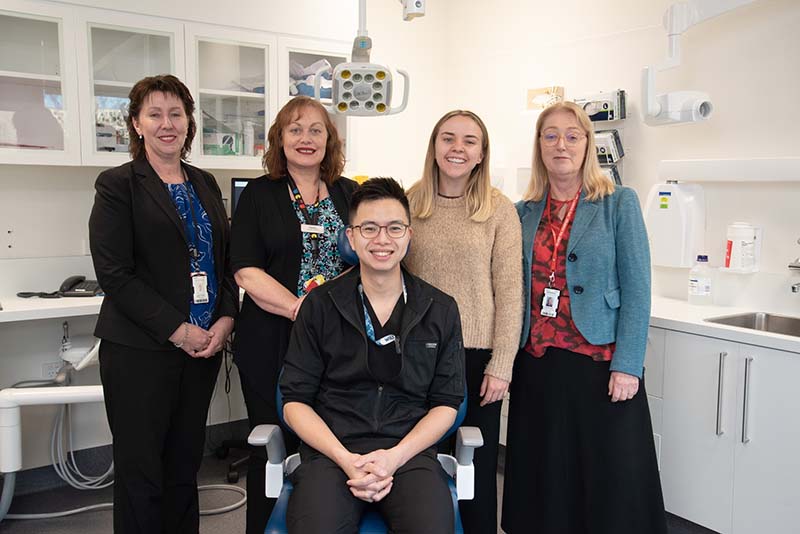Focus on Diabetes: Clinical Characteristics of Patients Undergoing Dental Clearance
During her 2023 summer break, fifth year Otago University medical student Kathryn Barnhill led a research team to undertake a retrospective clinical audit of the Hospital Dental Service, and adult diabetes services in the Outpatient Department at Te Whatu Ora Waitaha (Canterbury).
Kathryn is one of five students who received a summer internship to carry out a research project in New Zealand with a focus on diabetes. The internships were co-funded by NZSSD and the Diabetes New Zealand Research Foundation.

Pictured: Kathryn Barnhill (summer student) with her research team from the diabetes and dental departments. Kathryn is second from right.
2022/2023 Summer Student Report
People with diabetes are at greater than average risk of developing dental problems. If left untreated, this can progress to end stage oral health. This may then require removal of any remaining diseased teeth, with a procedure called a full dental clearance. If dental clearance and subsequent dentures are required, this may improve the patient's overall quality of life and health. Māori and people living in low socioeconomic settings are two groups at highest risk of suffering from end stage oral health. They may benefit from having a full dental clearance, but often cannot afford to have this procedure done through their community general dental practitioner, as it can cost thousands of dollars.
During the summer break from my medical student studies, I worked with the Hospital Dental Service and adult diabetes services in the Outpatient Department at Te Whatu Ora Waitaha (Canterbury), where I undertook a retrospective clinical audit. We wanted to assess whether the Hospital Dental Service was achieving its objective of preferentially undertaking dental clearance in those with high social needs. We were also interested in seeing whether people with diabetes were accessing this dental service more than people without diabetes. Both hypotheses were found to be true. These findings led to the diabetes department producing educational materials for patients undergoing major dental procedures, aimed at reducing low blood glucose levels and maintaining nutritional requirements. This research also highlighted the need to have greater focus on oral health in high-risk patients, with the aim of preventing progressive deterioration in their oral health.
Personal highlights of the summer studentship were presenting my research findings at the NZSSD scientific meeting in Wellington, working within a welcoming and enthusiastic multidisciplinary team who advocate strongly for better, equitable care, and getting an introduction to the world of clinical research.
Kathryn Barnhill
5th year Medical Student
University of Otago, Christchurch
Host and Sponsors: University of Otago Christchurch, NZSSD (New Zealand Society for the Study of Diabetes), DNZRF (Diabetes New Zealand Research Foundation) and Diabetes Christchurch
